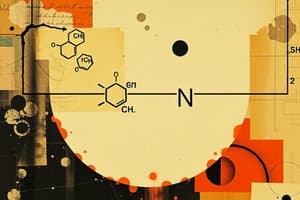Podcast
Questions and Answers
What type of reaction is characterized by a single-step process and the formation of a transition state?
What type of reaction is characterized by a single-step process and the formation of a transition state?
- SN2 (correct)
- Nucleophilic Addition
- Electrophilic Addition
- SN1
In an SN1 reaction, the rate of the reaction is independent of the solvent used.
In an SN1 reaction, the rate of the reaction is independent of the solvent used.
False (B)
What is the first step in an SN1 reaction?
What is the first step in an SN1 reaction?
Carbocation formation
Haloalkane reactions are generally ______ than Haloarene reactions.
Haloalkane reactions are generally ______ than Haloarene reactions.
Match the following terms with their descriptions:
Match the following terms with their descriptions:
Flashcards
SN2 Reaction
SN2 Reaction
A single-step nucleophilic substitution reaction where one molecule participates in the reaction forming a product quickly.
SN1 Reaction
SN1 Reaction
A two-step nucleophilic substitution reaction, involving a carbocation intermediate and slower than SN2 reactions.
Haloalkane vs Haloarene
Haloalkane vs Haloarene
Haloalkane reactions are faster than Haloarene reactions due to differences in reactivity caused by resonance and mesomeric effects which make Haloarenes less reactive.
SN2 mechanism
SN2 mechanism
Signup and view all the flashcards
SN1 mechanism
SN1 mechanism
Signup and view all the flashcards
Study Notes
Nucleophilic Substitution Reactions
-
Bimolecular Nucleophilic Substitution (SN2):
- A single-step reaction
- Forms a transition state
- Involves two molecules in the rate determining step
- Rate depends on the concentration of both alkyl halide and the nucleophile
- Favored by primary alkyl halides
- Proceeds via inversion of configuration
- Polar aprotic solvents are favorable
-
Unimolecular Nucleophilic Substitution (SN1):
- A two-step reaction
- Forms a carbocation intermediate
- The rate-determining step involves only one molecule
- Rate depends on the concentration of the alkyl halide alone
- Favored by tertiary alkyl halides
- Proceeds via racemization and retention of configuration
- Polar protic solvents are favorable
Studying That Suits You
Use AI to generate personalized quizzes and flashcards to suit your learning preferences.




